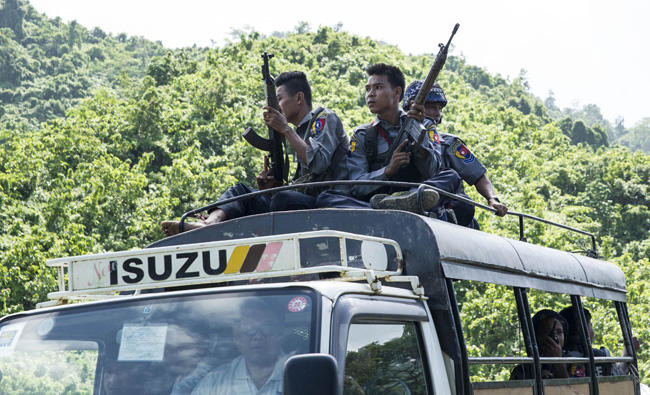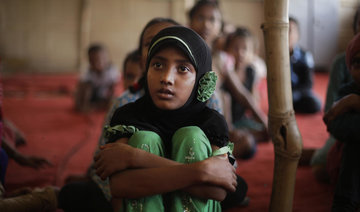DHAKA: Bangladesh on Monday proposed joint military operations with Myanmar against Rohingya militants fighting in Rakhine state, where thousands of villagers have fled fresh violence in recent days, an official said.
An upsurge in fighting in Rakhine, an impoverished state neighboring Bangladesh, has been raging since Friday when Rohingya militants staged coordinated ambushes against Myanmar’s security forces.
More than 100 people, including around 80 militants, have been confirmed killed in the fightback, which has seen thousands of Rohingya villagers fleeing for Bangladesh.
More than 3,000 Rohingya have arrived in Bangladesh from Myanmar, where the stateless Muslim minority faces persecution, in the past three days, the UN refugee agency said Monday.
Bangladesh has said there are thousands more Rohingya massed on its border with Myanmar, where it has stepped up patrols and pushed back hundreds of civilians who have tried to enter.
In a meeting with Myanmar’s charge d’affaires in Dhaka, a top Bangladeshi Foreign Ministry official proposed joint military efforts against the militants along the border.
“We proposed that if Myanmar wished, the security forces of the two countries could conduct joint operations against the militants, any non-state actors or the Arakan Army along the Bangladesh-Myanmar border,” a Foreign Ministry official said on condition of anonymity, as he was not permitted to speak to the media.
The Arakan Rohingya Salvation Army (ARSA) is a militant group that claims it is fighting to protect the Muslim minority from abuses by Myanmar security forces and the majority-Buddhist Rakhine community.
There was no comment from the Myanmar diplomat.
At the weekend, as violence in Rakhine worsened, Bangladesh’s foreign minister summoned Myanmar’s charge’d affaires in Dhaka to express “serious concern” at the possibility of a fresh refugee influx.
There are already some 400,000 Rohingya refugees in Bangladesh in squalid camps near its border with Myanmar.
Bangladesh is waging a bloody crackdown on homegrown religious militancy and has vowed “zero tolerance” toward violent extremism, domestic or otherwise, on its soil.
Dhaka has repeatedly asked Myanmar to take back the Rohingya refugees and address the root causes of problem “through a comprehensive and inclusive approach.”
Despite decades of persecution, the Rohingya in Myanmar’s western Rakhine state largely eschewed violence.
But in October ARSA, a small and previously unknown militant group, staged a series of deadly attacks on security forces. Myanmar’s military responded with a massive security crackdown. Some 87,000 new refugees flooded into Bangladesh bringing with them harrowing stories of murder, rape and burned villages.
The UN believes the army’s response may amount to ethnic cleansing, allegations denied by the government of Aung San Suu Kyi and the army.
In recent months the day-to-day fighting died down, but civilians described being trapped between army “clearance operations” and an assassination campaign by the militants, who are murdering anyone suspected of collaboration.
Bangladesh offers Myanmar military aid against Rohingya rebels
Bangladesh offers Myanmar military aid against Rohingya rebels

Indonesian president inaugurates Hajj and Umrah airport terminal in Jakarta

- Indonesian Hajj pilgrims have started departing for Saudi Arabia since Friday
- Kingdom’s Makkah Route initiative will be implemented at new Hajj and Umrah terminal
JAKARTA: Indonesian President Prabowo Subianto inaugurated on Sunday a special terminal for Hajj and Umrah pilgrims at Jakarta’s international airport, where travel will also be facilitated under Saudi Arabia’s Makkah Route initiative.
Indonesia, which has the world’s largest Muslim-majority population, sends the highest number of Hajj and Umrah pilgrims every year.
As pilgrims around the world have already begun to make their way to Saudi Arabia for Hajj this year, about 221,000 people will be coming from Indonesia.
“The government wants to give the best service for our pilgrims. We also understand that many of our pilgrims are seniors, and so we must take very good care of them,” Subianto said during the inauguration ceremony at Soekarno-Hatta International Airport.
“We understand that our pilgrims have saved up for a long time, and even waited for a long time, and so the government under my leadership will do our very best to give the best services and work hard to lower the cost of Hajj.”
The airport’s 2F terminal area, which has undergone renovations, has been transformed into a dedicated area for Indonesia’s Hajj and Umrah pilgrims. It was developed to serve 6.1 million travelers annually, according to a statement issued by the Cabinet Secretariat.
The launch event was attended by Saudi Ambassador to Indonesia Faisal Abdullah Amodi, as well as other Indonesian ministers, including Religious Affairs Minister Nasaruddin Umar and State-Owned Enterprises Minister Erick Thohir.
Special counters for Saudi immigration, which are part of the Kingdom’s Makkah Route initiative, have also been set up at the new terminal.
The program launched in Muslim-majority countries in 2019 allows Hajj pilgrims to fulfill all visa, customs and health requirements in one place, at the airport of origin, and save long hours of waiting before and upon reaching the Kingdom.
In Indonesia, pilgrims departing from the cities of Jakarta, Surabaya and Solo are benefiting from the Makkah Route initiative.
“As President Prabowo said, this is proof of the government’s commitment to give the best service, especially for our senior pilgrims. He is also proud of the modern and comfortable facilities that have been set up,” Umar, the religious affairs minister, said on social media.
Thousands of Indonesian pilgrims have begun to depart for Saudi Arabia, after the first Hajj flights commenced last Friday.
Though the pilgrimage itself can be performed over five or six days, many pilgrims arrive early to make the most of the once-in-a-lifetime opportunity to fulfill their religious duty.
In 2025, the Hajj is expected to take place on June 4 and end on June 9.
Five policemen kidnapped in southwestern Pakistan

QUETTA: A separatist militant group in southwestern Pakistan on Sunday claimed an attack on a prison van in which five police officers were taken hostage.
Between 30 and 40 gunmen blocked a major highway that cuts across Balochistan province overnight on Friday, intercepting a prison van being transported by a police team, a police official said.
“The prisoners were released later but five policemen have been kidnapped,” a senior police official in the area, who was not authorized to speak to the media, told AFP on Sunday.
He said a rescue operation was underway.
The gunmen also set fire to government buildings and a bank in the area.
A senior government official, who asked not to be named, said that two gunmen were killed by security forces.
Pakistan has been battling a separatist insurgency in Balochistan for decades, where militants target state forces, foreign nationals, and non-locals in the mineral-rich southwestern province bordering Afghanistan and Iran.
The Baloch Liberation Army (BLA), the most active group in the region, claimed the assault in Kalat district.
The BLA has previously targeted energy projects receiving foreign financing — most notably from China.
In March, the group seized a train, taking hundreds of passengers hostage and killing off-duty security forces in a three-day seige.
Two dead, 31 injured in Croatia bus crash

- he health ministry, cited by state news agency Hina, said several badly hurt people had undergone operations in hospital
ZAGREB: Two people died and 31 people were injured when a Bosnian-registered coach and a car crashed into each other in Croatia on Sunday, police and medical staff said.
The accident occurred at 3:00 am (0100 GMT) on a busy freeway some 50 kilometers (30 miles) east of the capital, Zagreb.
The casualties were taken to nearby hospitals, police spokeswoman Maja Filipovic told AFP, adding that an investigation had been launched to determine the causes.
The health ministry, cited by state news agency Hina, said several badly hurt people had undergone operations in hospital.
Photos published by local media showed a double-decker bus lying on its side in the middle of the freeway with its windows broken.
15 killed in head-on road crash in South Africa

- South Africa has a sophisticated and busy road network
- Road accidents claimed more than 11,800 lives in 2023
JOHANNESBURG: A night-time collision between a packed minibus taxi and a pick-up truck has killed 15 people in rural South Africa, a transport official said on Sunday.
Five people were in hospital with serious injuries after the crash at around midnight on Saturday to Sunday near the Eastern Cape town of Maqoma, about 1,000 kilometers (620 miles) south of Johannesburg, provincial transport spokesman Unathi Binqose official told broadcaster Newzroom Afrika.
The drivers of both vehicles were among the dead and an inquest would be opened to determine what happened, Binqose said.
The victims included 13 passengers in the minibus, which was reportedly traveling from the town of Qonce to Cape Town, a journey of nearly 1,000 kilometers.
South Africa has a sophisticated and busy road network. It also has a high rate of road deaths, blamed mostly on speeding, reckless driving and unroadworthy vehicles.
Road accidents claimed more than 11,800 lives in 2023, with pedestrians making up around 45 percent of the victims, according to the latest data from the Road Traffic Management Corporation.
Putin says he hopes there will be no need to use nuclear weapons in Ukraine

- Fear of nuclear escalation has been a factor in US officials’ thinking since Russia invaded Ukraine in early 2022
MOSCOW: Russian President Vladimir Putin said in comments broadcast on Sunday said that the need to use nuclear weapons in Ukraine had not arisen, and that he hoped it would not arise.
In a fragment of an upcoming interview with Russian state television published on Telegram, Putin said that Russia has the strength and the means to bring the conflict in Ukraine to a “logical conclusion.”
Responding to a question about Ukrainian strikes on Russia from a state television reporter, Putin said: “There has been no need to use those (nuclear) weapons ... and I hope they will not be required.”
He said: “We have enough strength and means to bring what was started in 2022 to a logical conclusion with the outcome Russia requires.”
Putin in February 2022 ordered tens of thousands of Russian troops into Ukraine, in what the Kremlin calls a “special military operation” against its neighbor.
Though Russian troops were repelled from Kyiv, Moscow’s forces currently control around 20 percent of Ukraine, including much of the south and east.
Putin has in recent weeks expressed willingness to negotiate a peace settlement, as US President Donald Trump has said he wants to end the conflict via diplomatic means.
Fear of nuclear escalation has been a factor in US officials’ thinking since Russia invaded Ukraine in early 2022. Former CIA Director William Burns has said there was a real risk in late 2022 that Russia could use nuclear weapons against Ukraine.





















